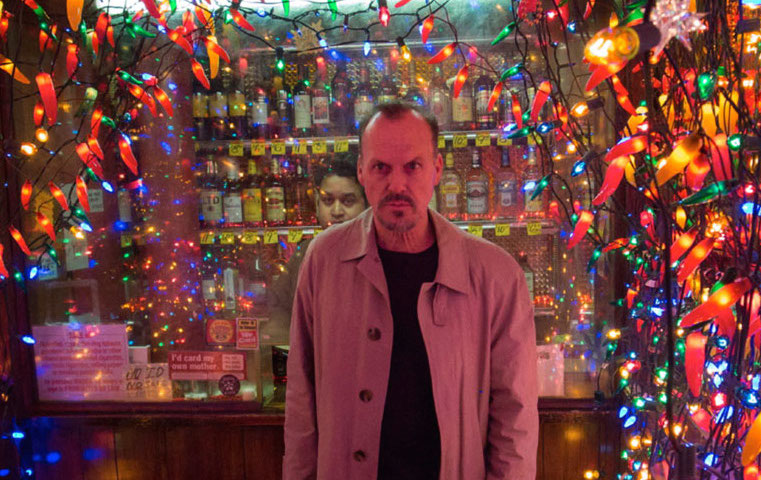In one of the many remarkable scenes in Alejandro González Iñárritu’s Birdman, the main character, an actor named Riggan Thomson (played by Michael Keaton) steps outside the Broadway theater where he is performing for a smoke. The stage door slams shut behind him, locking him out and snagging the bottom of his dressing gown. The only way he can extricate himself is by slipping off and abandoning the gown; wearing only his underpants, he has to get through gaudily lit Times Square to the main entrance of the theater, where he is due on stage in a dramatic adaptation of a Raymond Carver short story—a play he has written, directed, and of which he is the star.
As he half-struts, half stumbles through the crowds, his face has the glazed fixity of a penitent on a pilgrimage, or a martyr in a painting by Zurbarán; the soundtrack thrums with street noise, with the cacophony of voices (some of which call him by name) and with the jittery, anxiety-inducing jazz drum solo that runs throughout much of the film. Everything about this manic trek seems at once strange and familiar in a way that evokes a nightmare—or a pair of nightmares—so common that many of us have probably had them, ourselves: the dream of suddenly discovering that you are naked in public, the dream of not being able to find or reach the place where you are supposed to be.
Iñárritu’s feature films have all, in different ways, descended into a nightmare and managed to combine the hallucinatory and the gritty, to mix surrealism with political and social criticism. Amores Perros (2000) involved a trio of ghastly scenarios: the vicious subculture of Mexico City dog fighting, the daily life of a homeless man in the Mexican capital, and the panic of a woman who hears the terrified barking of her beloved pet dog, trapped in a crawl space beneath her apartment. Both 21 Grams (2003) and Babel (2006) portray a series of tragic events, among them a suicide, a horrific accident, and the death of a child. The brilliantly acted but almost unendurably sad Biutiful (2010) plunges us into one of the most awful fantasies one can imagine: a petty crook dying of cancer makes one catastrophic mistake after another and ultimately cannot even ensure that his two beloved children will be taken care of after he dies.
With these earlier films, it has sometimes seemed necessary to be an unusual admirer of Iñárritu’s work in order to observe willingly the excruciating agonies he has shown us; to bother weaving together, in our minds, multiple complicated and sometimes soap-operatic plots; and to overlook the occasional sententiousness of Babel, or the Dostoyevskian flailing about that makes parts of 21 Grams something of a trial to watch.
Birdman, which has been nominated for numerous Oscars, including Best Picture, Best Director, and Best Actor, is a departure. In some sense it’s as dark as his other films, but it’s considerably more fun. Iñárritu has taken his cinematic nightmare to the Great White Way, illuminated it with Broadway footlights, located the pathos—and the hilarity—in the New York stage, and given us a cast of nuanced and beautifully acted minor characters. The trials of these suffering souls are as affecting but less wrenching than the plight of the Chinese illegal immigrants living in an unheated Barcelona warehouse in Biutiful. And in the corner of hell in which Birdman transpires, the damned are tortured not by grief, poverty, or illness, but rather by the desire to create an enduring work of art that can, if things go wrong, be obliterated overnight by one negative review in The New York Times.
Iñárritu hasn’t lost interest in the fate of his characters’ immortal souls (each weighing twenty-one grams, as we learned in the earlier film) or in questions of sin and absolution, but in Birdman the director has at last allowed himself some playfulness and humor—albeit a very Mexican species of humor, the jollity of the grinning skull—as well as the sort of satire that depends on psychological acuity and a close observation of social behavior. One hilarious, harrowing, and convincing scene portrays a press conference during which Riggan must endure the incomprehension, the pretensions, and the sheer vulgarity of the journalists sent to interview him. A playwright friend said that what she liked best about the film was the comic spectacle of egomaniacal theater types ranting and raving about being authentic.
Though 21 Grams and parts of Babel were set in the United States, Birdman is the first film in which Iñárritu has fully integrated his own obsessions and those of Hispanic and Mexican culture—affliction, martyrdom, penitence, and salvation—with the passions for fame, celebrity, money, achievement, and reputation that hold this country in thrall. And these apparently irreconcilable dualities are reflected in Keaton’s striking performance, which succeeds in combining the deranged preoccupations of a maniac with the heart and conscience of a responsive and sentient human being.
Advertisement
On Riggan’s path toward (at least partial) redemption, he is mocked and tormented by his previous incarnation: a superhero named Birdman, the subject of three successful films. A black-feathered avian creature makes periodic appearances in Riggan’s dressing room, and later perches on a toilet in a hospital bathroom. Thanks to Iñárritu’s ingenious, light-handed and surprising use of CGI, the fanciful bird takes wing and sweeps through the film, like a giant pterodactyl. There are some astonishing moments when we see what are—or what Riggan thinks are—his residual superpowers in action, instances that remind us that film is a marvelous medium (perhaps the only viable one) for portraying levitation and telekinesis. In yet another inspired touch, the tough, growling voice that Riggan hears in his head is the voice of Birdman, that is to say, the voice of Mammon, telling him that the sacrifices he is making for his art are wasted, that his ambitions are delusional, that his dressing room is a “shithole,” and that audiences love blood and action and “not this talky, depressing, philosophical bullshit.”
The sad, bittersweet—Raymond Carveresque—joke at the heart of film is that Birdman’s skepticism is not entirely misplaced. The scenes from Riggan’s drama that we see—even when dazzlingly played by Keaton, Naomi Watts, Andrea Riseborough, and Edward Norton (as the mercurial, gifted actor who joins the cast)—are the pretty awful stuff of kitchen melodrama; they lack the delicate subtext that makes so much of Carver’s story seem to happen between the lines. And we may well wonder why anyone would seriously imagine that, at this moment in our cultural history, a four-character drama based on “What We Talk About When We Talk About Love” would be a popular draw. Over the past decade, I have been repeatedly surprised, even shocked, by how few students—undergraduates and MFA candidates alike—still read Raymond Carver, or even recognize his name. But even if Iñárritu knows that, Riggan certainly doesn’t, and he is staking his life, his future, and the house that is supposed to go to his daughter, on the play’s success. He is determined to create a work that is “important,” and from early on in the film, we suspect that it will require something very extreme to make that occur.
My admiration for Birdman was intensified by the fact that, just a few days before, I’d streamed The Player, Robert Altman’s sly, scathing critique of the Hollywood studio system’s insistence that films be hackneyed, maudlin, banal, predictable, safe, and aimed at an audience with the intelligence and attention span of a not-terribly-bright eight-year-old. Birdman is none of these things, and among the risks that Iñárritu has taken is to have assumed that an audience for it exists: smart, savvy viewers who can at once appreciate—and see beyond and beneath—its innovative technique, its nested ironies, and its knowing in-jokes.
For the most part, this gamble has paid off. Birdman has been nominated for nine Academy Awards and has received a great deal of popular and press attention. Yet the ultimate irony may be that so much of the critical conversation has focused on the surface of a film that is about (among other things) the difficulty of delving beneath the surface—the fleeting distractions, pretensions, and cheesy rewards of our entertainment culture—in order to create something more profound and substantial.
Nearly every review I’ve read has mentioned the fact that Birdman has been shot and edited in a way so as to seem as if it had been filmed in one single, continuous take; that it manages to recreate the claustrophobia of being backstage in the narrow, grubby corridors of a Broadway theater; that Michael Keaton, who played Batman in three successful action adventure films, is playing Riggan, who made his reputation playing the titular superhero; and that the movie contains a number of references to canonical, cerebral authors (Barthes, Borges, Sontag) and classic films.
These references have given cineastes and academically-minded critics an apparently irresistible opportunity to show off. Richard Brody’s review in The New Yorker not only mentions Godard and Hitchcock but also “Jean-Marie Straub and Danièle Huillet, Chantal Akerman, Abbas Kiarostami, Tsai Ming-liang, Hong Sang-soo, Lisandro Alonso, Pedro Costa.” An essay in Forbes magazine criticized Iñárritu for basing Riggan’s play on the original published version of the Carver story, which was alleged to have been substantially changed by his editor Gordon Lish, instead of on the draft that was later published and that was, according to Carver’s widow, closer to what Carver intended. I read the Forbes writer’s detailed comparison of the two versions and remained unable to fathom how any of this might possibly affect our understanding of the film: indeed, why any of it should matter.
Advertisement
What does matter is Birdman’s extraordinary originality, its intensity, its depth, its mixture of nightmare and fun. Like Riggan staggering through Times Square, Birdman charges forward, headlong and without stopping, alternately scourging and exalting its audience with the genuine pain and the holy-fool ridiculousness of a “washed-up” former superhero intent on becoming a martyr to art.



